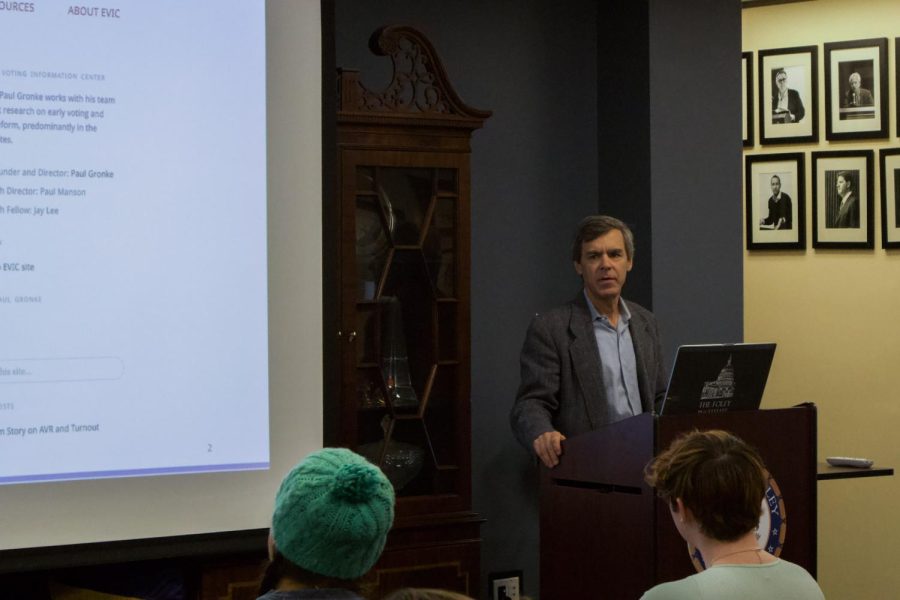Professor encourages skepticism of politicians’ motivations
Paul Gronke is worried about secretaries of state following 2021 election
Political science professor Paul Gronke discusses the increasing popularity of voting by mail after 2020, Oct. 25.
October 26, 2022
Politicians casting doubt on the U.S. election system is deeply concerning for political science professor Paul Gronke, who believes it threatens democracy.
“I want to be optimistic, but we are in a very tough place right now, where political actors are willing to undermine democratic principles as a political strategy,” he said.
Gronke, who is from Reed College and is the director and founder of the Elections & Voting Information Center in Oregon, shared his thoughts about voting and elections to students at the Foley Institute presentation Tuesday afternoon on campus.
“What I really want to do is provide you the tools, so you can evaluate the political world out there,” Gronke said.
Gronke encouraged attendees to always be skeptical of political actors’ claims and understand their motivations. It seems there is a new voting war in the U.S. with actions taken by some states to make it harder to vote, including new voter ID requirements and restrictions on voting by mail, he said.
At the state level, Gronke is deeply worried about the secretary of state candidates who are promoting election lies, especially after their credibility was called into question after the alleged fraud in the 2021 election, he said.
In the Washington Secretary of State election, the democratic candidate, Steve Hobbs, is opposed to ranked choice voting while the independent candidate, Julie Anderson, supports it, Gronke said.
Based on the data he provided, there are reasons that some candidates may not want to adopt ranked choice voting, particularly because they may have a harder time winning if it were adopted, Gronke said.
He believes ranked choice voting will be more likely to be adapted on a state-by-state basis, but it will most likely not be implemented at the presidential level, he said.
Gronke said there are highly diverse practices, policies and technologies across the different states. In our system of government, many government powers are given to states through a federalized election landscape.
In this election landscape, the country has become increasingly polarized because policy reforms are driven by political competition, he said.
Looking forward toward the midterms, election reforms – like redistricting – will have a generally small impact, Gronke said. The fundamental issues are usually what determine the midterm results, such as the economy, partisanship and traditional midterm seat loss.
Gronke also discussed the turnout effects of voting by mail. Gronke said voting by mail lowers the costs of voting, so it is presumed it should increase voter turnout. However, he pointed out that there is disagreement among journalists and polls if voting by mail does or does not increase turnout.
Rates of voting by mail have gradually increased since 1992, and they doubled in 2020 due to the pandemic. He said the early numbers for the upcoming elections show this may be a continuing trend.
“We may have witnessed a fundamental shift in politics because governors decided to send ballots to people and they might have decided they like it,” he said.
Gronke said he could not imagine the Supreme Court implementing a mandatory voting system, like Australia. However, he did say this system most likely provides a higher turnout than the American system, which generally is very low.
He also introduced the concept of new institutionalism in social sciences, in which rules affect actions, and actions affect outcomes, which can lead to new rules, new actions and new outcomes. Then, the cycle begins all over again, he said.
“How new institutionalism functions is you have a set of actors that choose strategies that maximize the probability of a desired goal,” he said.
Following Gronke’s presentation, WSU’s next Foley Institute event will be held on Thursday, featuring U.S. Representative Cathy McMorris Rodgers.










